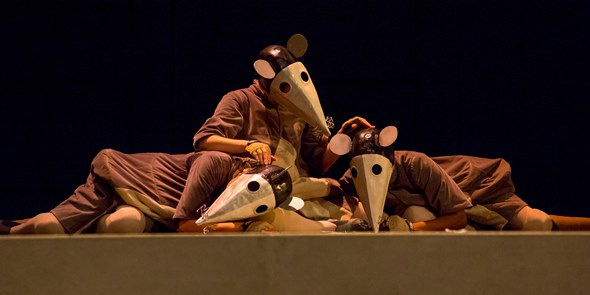Rossini’s ‘Cinderella’ at the Lyric: Bright voices and colors and wit (plus a Greek chorus of rats)
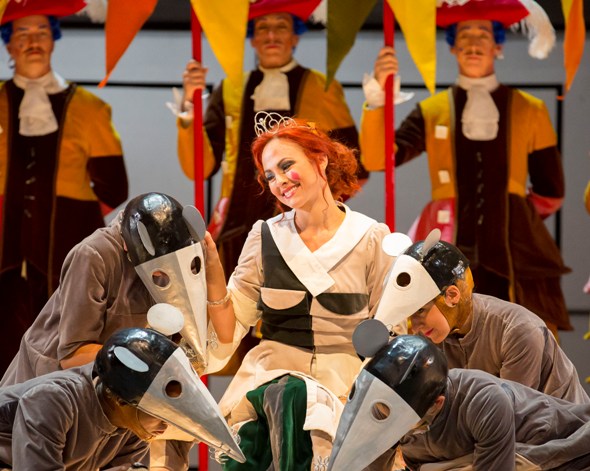 Review: Rossini’s comedy “Cinderella” (La Cenerentola) at Lyric Opera of Chicago through Oct. 30. ★★★★★
Review: Rossini’s comedy “Cinderella” (La Cenerentola) at Lyric Opera of Chicago through Oct. 30. ★★★★★
By Nancy Malitz
With its blindingly bright colors and brilliant musical hijinks, the Lyric Opera of Chicago’s current production of Rossini’s “Cinderella” plays out like a surreal dream that might possess one in the wee hours of the night. It makes perfect sense while it’s happening, zany and hypnotic at the same time. Rossini’s music is wrapped in a fanciful 2007 production by Barcelona director Joan Font and designer Joan Guillén that goes well beyond the boring rules of logic.
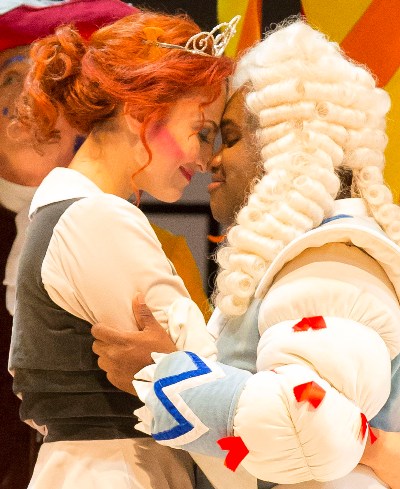 A persecuted cinder girl (called Angelina) lives by a giant fireplace capable of majestic transformation. She is befriended by a Greek chorus of balletic rats. They are of human size, with sensitive hearts, poetically expressive tails and contortionist poses that channel Cinderella’s flights of fancy and provide ample spillways for her sadness. Her adoring BFF’s also respond to the charm of Rossini’s music, beating time happily with their delicate front paws.
A persecuted cinder girl (called Angelina) lives by a giant fireplace capable of majestic transformation. She is befriended by a Greek chorus of balletic rats. They are of human size, with sensitive hearts, poetically expressive tails and contortionist poses that channel Cinderella’s flights of fancy and provide ample spillways for her sadness. Her adoring BFF’s also respond to the charm of Rossini’s music, beating time happily with their delicate front paws.
By all means, bring the kids.
Lyric’s presentation of the Cinderella story is a wonderful thing, joyfully on the mark from the very beginning. The first indication that the Lyric was going to get Rossini’s opera right came in the overture. The light shone on a regal red velvet curtain, but the curtain stayed down as the orchestra teased and churned under the light touch of Andrew Davis’ baton. You could feel the music doing its work as the audience seemed to give in to its irresistible momentum and sparkle.
Rossini insisted that he would write “La Cenerentola” only if he could take out all the magical elements. Thus, Cinderella’s nemesis is a stepfather so cruel and greedy that he declares his third “daughter” to be dead even as she stands beside him. Instead of glass slippers, it’s bracelets that Rossini’s opera dictates. And there is no fairy godmother, rather a court philosopher helping the prince to find his mate.
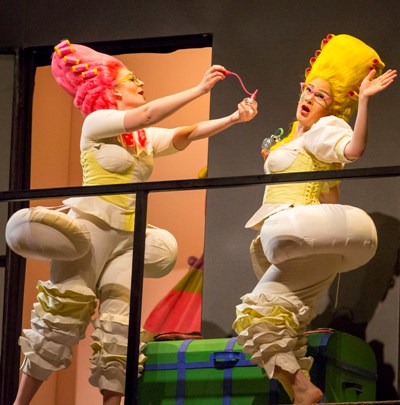 Yet, these days some of “Cinderella’s” magic is often restored, as it is at least by half in this vision by the director Font and his longtime collaborator, set designer and cartoonist Guillén.
Yet, these days some of “Cinderella’s” magic is often restored, as it is at least by half in this vision by the director Font and his longtime collaborator, set designer and cartoonist Guillén.
And a bit of Disneyesque frivolity is on parade. The stepsisters are garish girls with fanciful piles of neon hair and ridiculous donuts around their bums. (These roles were impeccably developed into pouting turns by two spirited, full-voiced members of the Lyric’s Ryan Opera Center program — soprano Diana Newman as Clorinda and mezzo-soprano Annie Rosen as Tisbe.) And in addition to the amiable cavorting rodents, animated with what choreographer Xevi Dorca calls “rat attitude,” there is the prince’s retinue, an all-male chorus bewigged in blue, hilariously lock-stepped even as they engage in substantial song.
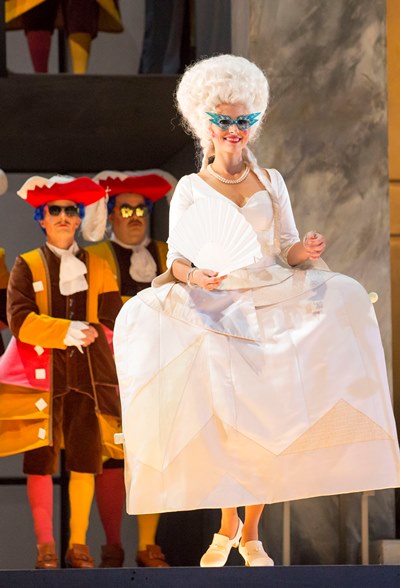 Font and Guillén’s dreamlike remix of the sober, silly and sweet seems about right to me. I did not see this “Cinderella” when Lyric Opera general director Anthony Freud first introduced it in 2007 at the Houston Grand Opera, which Freud was running at the time. But I’m not surprised to see it at the Chicago Lyric now. It was an early Freud success as a project, highly adaptable with a minimum of stage bulk, and vibrantly lit by Albert Faura, who contrasted Angelina’s drab monochromatic world with the bold, sunlit colors of her adventure. It’s no wonder this “Cinderella” always seems to be playing somewhere — Los Angeles, Washington D.C., Seattle, Toronto, Cardiff, Barcelona, Geneva, Brussels.
Font and Guillén’s dreamlike remix of the sober, silly and sweet seems about right to me. I did not see this “Cinderella” when Lyric Opera general director Anthony Freud first introduced it in 2007 at the Houston Grand Opera, which Freud was running at the time. But I’m not surprised to see it at the Chicago Lyric now. It was an early Freud success as a project, highly adaptable with a minimum of stage bulk, and vibrantly lit by Albert Faura, who contrasted Angelina’s drab monochromatic world with the bold, sunlit colors of her adventure. It’s no wonder this “Cinderella” always seems to be playing somewhere — Los Angeles, Washington D.C., Seattle, Toronto, Cardiff, Barcelona, Geneva, Brussels.
What we’ve got onstage in Chicago is therefore a classic modern production, exquisitely polished, in a miracle of casting. Both mezzo-soprano Isabel Leonard as the wretchedly treated cinder girl and tenor Lawrence Brownlee as her enamored prince are capable of dazzling vocal pyrotechnics drenched in glorious sentiment. The coloratura singing throughout this show is sublime.
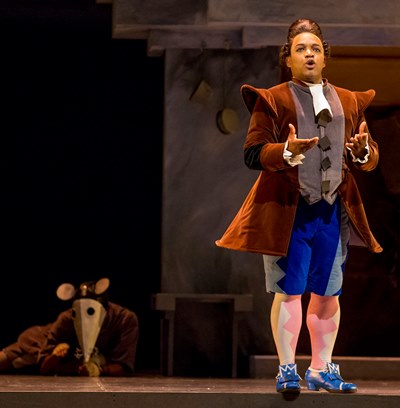 Brownlee was sensational in his Lyric debut, doing a technically impressive turn in his big bravura number, “Si, ritrovarla io giuro,” in which the prince vows to find the unknown beauty who has captured his heart, no matter what it takes. As he peppered his vows with a clutch of high C’s for emphasis and cavorted around the stage in an extended scene that involved some stage business with a giant carriage, the opening-day crowd went nuts for him.
Brownlee was sensational in his Lyric debut, doing a technically impressive turn in his big bravura number, “Si, ritrovarla io giuro,” in which the prince vows to find the unknown beauty who has captured his heart, no matter what it takes. As he peppered his vows with a clutch of high C’s for emphasis and cavorted around the stage in an extended scene that involved some stage business with a giant carriage, the opening-day crowd went nuts for him.
Meanwhile, Leonard was ideal as the opera’s beating heart, tragic, warm and graceful, yet given to passionately soaring flights of fancy. Her last aria, “Non più mesta” (No longer sad), brought a wistful turn to the end of the story. The particulars of Cinderella’s happily-ever-after ending are left in a somewhat ambiguous shadow in this production, a touch Rossini might have liked, but one which non-adults in the audience may safely ignore.
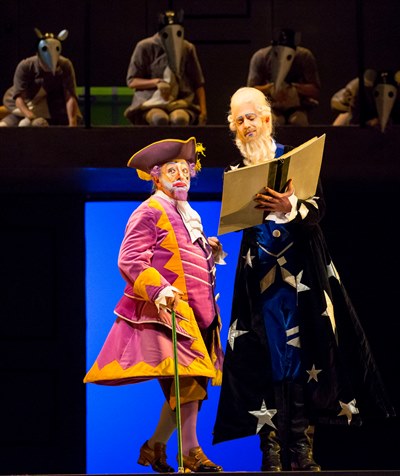 More wondrous singing came from bass-baritone Christian Van Horn as the court philosopher Alidoro, in the fairy godmother’s stead; he has plenty of magic in his bones although no pumpkin carriage is summoned. It’s a dignified if fanciful characterization, worthy of a Shakespearean Prospero or a Mozartean Sarastro. Alidoro’s aria, “Là del ciel nell’arcano profondo,” was grandly sung by the tall and vocally agile van Horn.
More wondrous singing came from bass-baritone Christian Van Horn as the court philosopher Alidoro, in the fairy godmother’s stead; he has plenty of magic in his bones although no pumpkin carriage is summoned. It’s a dignified if fanciful characterization, worthy of a Shakespearean Prospero or a Mozartean Sarastro. Alidoro’s aria, “Là del ciel nell’arcano profondo,” was grandly sung by the tall and vocally agile van Horn.
Two able comedians — baritone Alessandro Corbelli as the greedy stepfather, whose love song to payola is a stitch, and baritone Vito Priante, whose exchange of roles with his boss, the prince, is an all too brief power trip — rounded out a cast attuned to the ensemble spirit.
The star of the opera’s fine ensemble numbers is of course Rossini himself, and the director Font’s conception was admirable in that it generally avoided any extraneous movement during these extended episodes. A favorite came near the end of the opera, when six of the characters were seated at the very lip of the stage, marveling at the latest turn of events that would have the prince indeed marrying Cinderella. It’s a riveting staccato sextet with a lot of imitation, choreographed with neat little hand movements and stand-up-sit-down gestures that focused attention on Rossini’s musical tricks. The singers must have loved it.
Related Links:
- Performance location, dates and times: Details at TheatreinChicago.com
- Preview of Lyric Opera of Chicago’s complete 2015-16 season: Read it at ChicagoOntheAisle.com
Tags: Alessandro Corbelli, Andrew Davis, Annie Rosen, Christian Van Horn, Diana Newman, Isabel Leonard, Joan Font, Joan Guillén, La Cenerentola, Lawrence Brownlee, Lyric Opera of Chicago, Rossini, Vito Priante, Xevi Dorca


